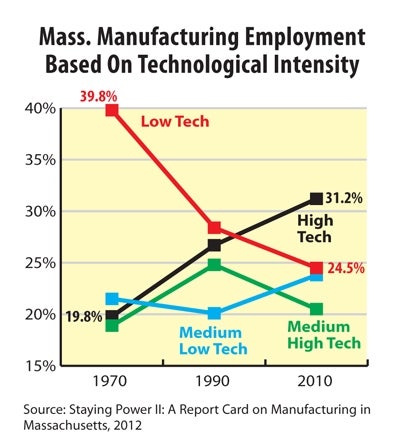Notable numbers from the recent manufacturing report out of Northeastern University clearly spell out the significant changes the sector has gone through in Massachusetts over the last four years. The rise in “high tech” jobs and the drop in employment levels are two factors that are clearly putting the focus on education and training efforts to keep those key industry jobs here.
The report found that the industry’s share of private-sector economic output increased in 2011 to a level that hadn’t been seen in eight years. On the other hand, manufacturing employment in Massachusetts has been steadily declining, from 324,000 in 2002 to 251,000 this year. The report foresees a much steadier manufacturing employment base, yet still projects the loss of another 12,000 jobs over the next six years.
So, while the good news is that the industry is still creating start-ups (43 in 2011) and boosting productivity, the flip side is that it employs fewer people.
Any economy — whether a town’s or a nation’s — needs a healthy mix of manufacturing. Build or make something, sell it and ship it to various markets around the world, and you create wealth for your citizens and increase the standard of living for everyone else. A half-century ago, the United States was a manufacturing behemoth, driven largely by the auto industry. But in today’s global economy, there are many other players, both big (think China) and small, and with the exception of parts of Europe, they are lower-cost producers.
The manufacturing industry has changed radically over these last 50 years, especially in Massachusetts, as the accompanying chart demonstrates. In 1970, jobs in companies whose work did not require a high degree of technical acumen accounted for nearly two-fifths of industry employment. Today, it’s the “high tech” companies that are the dominating force.
This underscores the importance the state is placing on boosting education in science, technology, engineering and mathematics to help feed the industry with talent. That’s becoming more critical since most of the state’s manufacturing workforce is above the age of 45, unlike all other industries, the report points out.
Yet perhaps just as important, the report underscores the role of community colleges in collaborating with the industry to boost the skills of the workforce. The report’s authors expressed concern that only about one in eight firms surveyed considered the state’s 15 community colleges vital as a training ground, and that only 3 percent of the firms consider the state’s workforce investment boards as very important in training workers to fill future vacancies.
Programs at area community colleges, such as Quinsigamond and Mount Wachusett, likely have a greater awareness, but still remain largely undiscovered as a source of talent and training by many firms. They shouldn’t continue to be a “best kept secret.” While the state has now centralized the governing oversight levels of these schools, their local connections with nearby manufacturers must be strengthened. Certainly, organizations like the Massachusetts Manufacturing Extension Partnership are in a position to help cement those bonds. Further, we hope more manufacturers recognize this avenue to produce and enhance talent. State leaders have also helped by the recent passage of an economic development bill that will provide funding for workforce and technological development. That’s a gift that can help pay many dividends for the long term.
Read more
Editorial: Cost Pressures In Health Care; Tilting At Airplanes?
Editorial: State Must Guard Against Growing Casino Market
Health Care Industry Must Drive Cost Containment
Study: Skills Gap In U.S. Manufacturing Not So Severe
Editorial: Change At Worcester Chamber
Walking The Plant Floor Again: Q&A With Curtis Industries President And CEO Scott Nelson
Election Winners Must Reduce Uncertainty For Small Businesses

